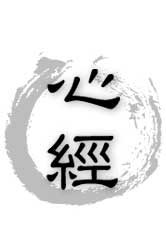The Heart of Prajñā Pāramitā Sutra
Bodhisattva Avalokiteśvara, while deeply immersed in prajñā pāramitā, clearly perceived the empty nature of the five skandhas, and transcended all suffering.
Śariputra! Form is not different from emptiness, emptiness is not different from form. Form is emptiness, emptiness is form. So it is with feeling, conception, volition, and consciousness.
Śariputra! All dharmas are empty in character; neither arising nor ceasing, neither impure nor pure, neither increasing nor decreasing.
Therefore, in emptiness, there is no form; there is no feeling, conception, volition, or consciousness ; no eye, ear, nose, tongue, body, or mind ; no form, sound, smell, taste, touch, or dharmas ; no realm of vision, and so forth, up to no realm of mind-consciousness ; no ignorance or ending of ignorance, and so forth, up to no aging and death or ending of aging and death. There is no suffering, no cause, no extinction, no path. There is no wisdom and no attainment. There is nothing to be attained.
The bodhisattva, by way of prajñā pāramitā, freed the mind from hindrances, cause there is no hindrances ; with no fear, freed from all distortion and delusion. ultimate nirvana is reached.
By way of prajñā pāramitā, Buddhas of the past, present, and future attain anuttara-samyak-sambodhi.
Therefore, prajñā pāramitā is the great powerful mantra, the great enlightening mantra, the supreme and peerless mantra. It can remove all suffering. This is the truth beyond all doubt. And the prajñā pāramitā mantra is spoken thus: " Gate gate pāragate pārasamgate bodhi svāhā. "

|

|